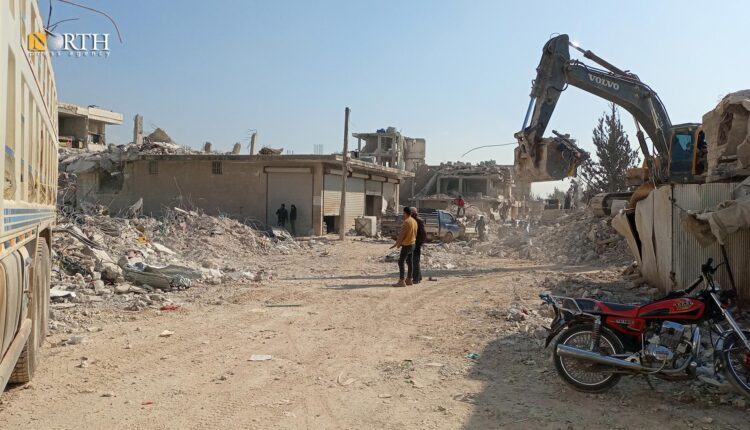
AFRIN, Syria (North Press) – Following the devastating Feb. 6 earthquake that hit Syria, Azad Hamo, a pseudonym for a 38-year-old man from the town of Jindires in Afrin countryside, northwestern Syria, grabbed a few belongings and rushed outside to escape frequent aftershocks that hit the region and caused more cracks in the house’s walls and fear in their heart of its collapse while they sleep.
“Like so many families whose houses have been damaged and no longer inhabitable, we resorted to staying in tents, cars, and shelters amid the cold weather with little aid,” Hamo told North Press.
On Feb. 6, a 7.8 magnitude devastating earthquake hit Syria and Turkey killing more than 50.000 people and injuries thousands more. The earthquake also caused the destruction of thousands of buildings and houses leaving thousands of families homeless.
“I cannot stay in my house anymore. The walls are cracked and need reinforcements. I can do nothing now with so few resources as businesses are suspended,” he added.
They need aid, and they are eligible more than others, but the story, which is told in the media, is contrary to the reality in that region.
“Since the day of the earthquake, my three children and I have spent the day in our cracked house. At night, we sleep in the tractor’s carriage, fearing robberies. We keep hoping an NGO or voluntary teams might come and rescue us from this gloomy fate,” he said.
Hamo stressed that the local council committees (formed by Turkey) in Jindires “has not inspected destroyed and damaged houses arguing that the crisis in the town is larger than the surrounding villages.”
The formerly Kurdish-majority region of Afrin has been under the Turkish occupation since March 2018 following the so-called “Olive Branch” military operation launched by the Turkish forces and the armed opposition factions, known as the Syrian National Army (SNA), to push away the Kurdish People’s Protection Units (YPG) under the pretext of protecting “Turkish national security.”
In the same village, Zangin Khello, a pseudonym for a 41-year-old man is plagued by his quake-damaged house, similar to hundreds of families in the other villages.
Kello, a father of four, said, “My wife sustained injuries and bruises on her arm because of fallen bricks as we left our house during an aftershock.”
“We called on NGOs, the local council, and operating teams in the region, but we only saw reporters who came to cover stories here for their agencies,” he added.
In February, members of Jaysh al-Sharqiyah, a faction within the Turkish-backed Syrian National Army (SNA), seized humanitarian aid sent from the Kurdistan Region of Iraq (KRI) to the people of Jindires in Afrin in the northern countryside of Aleppo.
In the same month, a local source told North Press that a commander within Ahrar al-Sharqiya in Jindires provided fake names to steal humanitarian aid sent to affected people.
Despite repeated attempts to register for a tent within temporary shelters, he had no luck obtaining one due to “massive nepotism that overrules the work of NGOs in the devastated region.”
Muhammad Rashid, a pseudonym for a 35-year-old man from the village of Korkan near the town of Jindires, does not have it better than others, as he is also suffering from the loss of his house in the village. He desperately wonders, looking for a roof to shelter him and his family in the cold weather of Winter.
Rashid said, “I sit in a village burdened by a harsh reality. The people have grown tired of factions’ fighting over taking the property of the forcefully displaced after the Turkish forces entered the region and of the robberies conducted by settlers and faction members.”
“Relief convoys passed by the villages of Faqira, Korkan, and Jolaqan as they headed to Jindires. These villages sustained significant damage from the quake but the local council and NGOs turned a blind eye to them,” he added.
He noted that the people of those villages “did not receive any aid, not even something to keep them warm. The wealthy people bought tents and set them up near their houses while many others sleep in their cracked houses despite the risk.”
